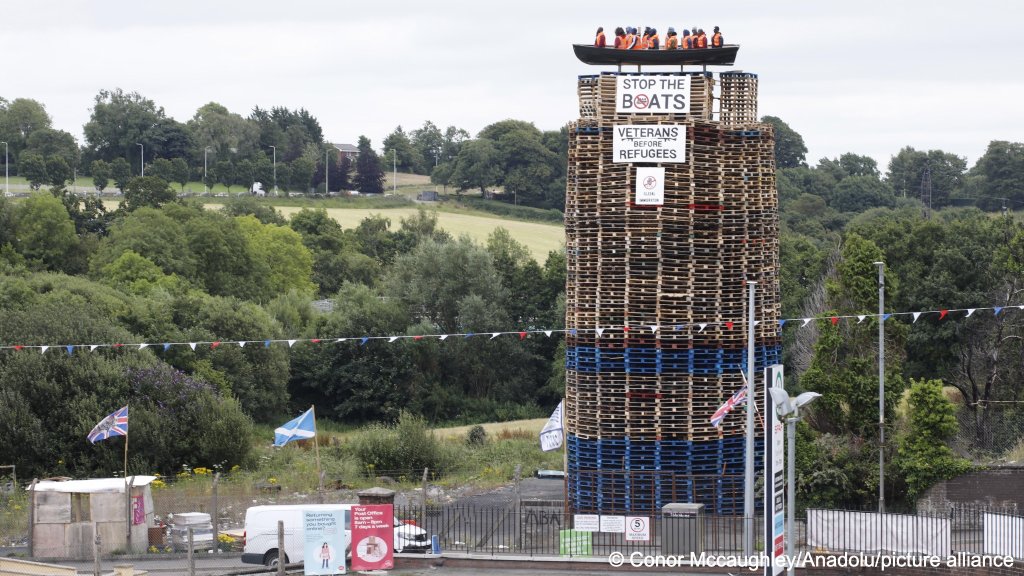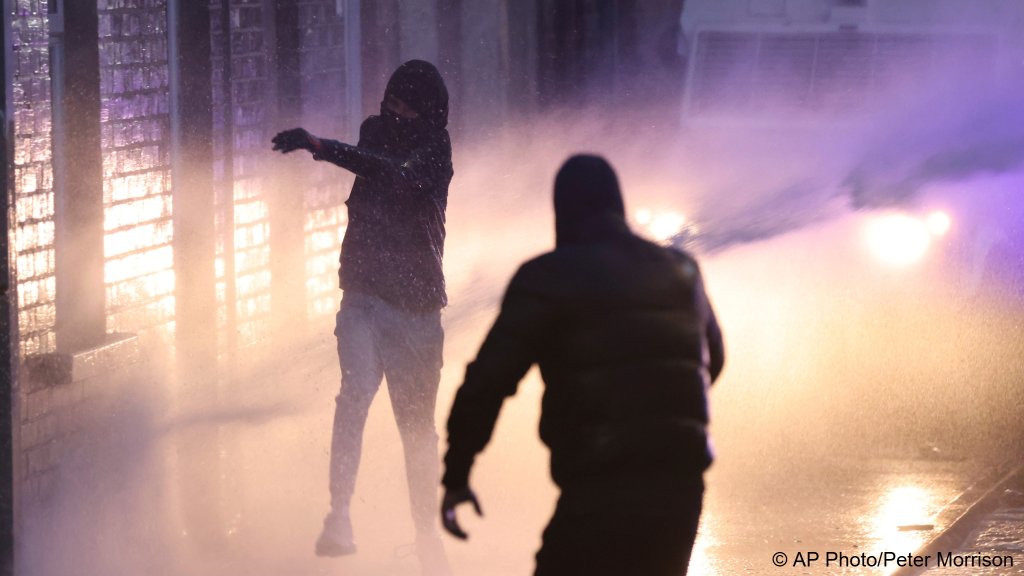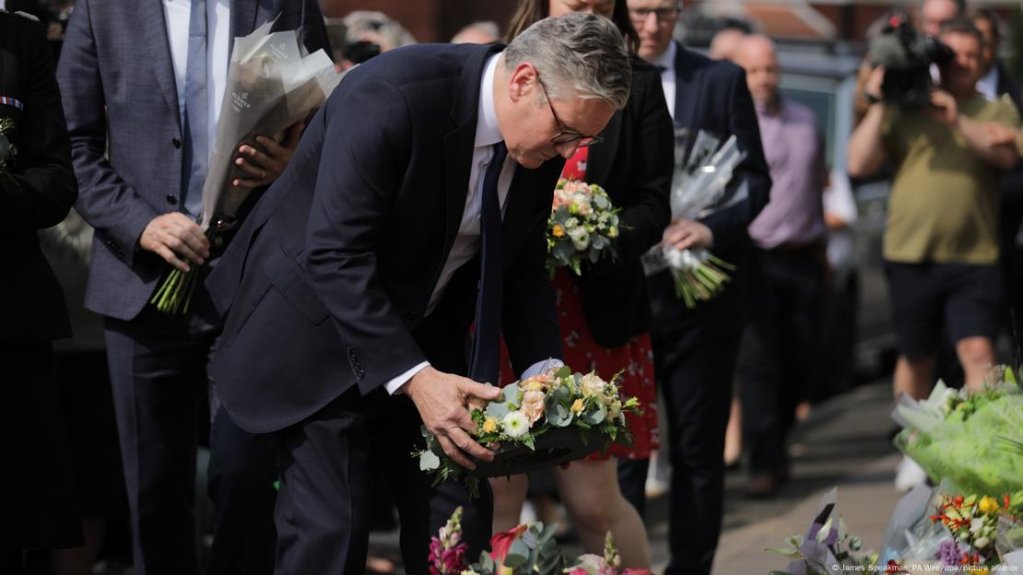Plans to burn an effigy of a migrant boat atop a bonfire in one small town in Northern Ireland have been condemned by some politicians in the country as "disgusting" and "hateful." Supporters of the bonfire claim it's a "cultural expression."
The period around July 12 is the height of the annual period every year known as ‘Marching Season’ in Northern Ireland, when mostly Protestant groups, also known as Unionist or Ulster Loyalist (loyal to the British crown), hold parades, marches and bonfires, celebrating a Protestant victory over Catholics in 1690. The season runs from Easter to September, but many of the most contentious events happen in July.
Because of the historical context in Northern Ireland, often referred to as ‘the Troubles’ and the deep sectarian divides between Protestants and Catholics, or those who would like to remain part of Britain, and those who would like to unite the island of Ireland, this time of year heightens already present flashpoints in the country.
In the past, effigies burnt on the bonfires have included nationalist flags and likenesses of nationalist politicians or leading figures.
This year, an effigy of a migrant boat, with life-size dummies wearing life jackets, was placed on top of a bonfire pyre due to be lit in the village of Moygashel, County Tyrone, in the coming days. Below the effigy, signs were placed on the wooden packing cases stating, "stop the boats" and "veterans before refugees."

Condemnation
Many politicians condemned the effigy. Colm Gildernew from Sinn Fein (a party that would like to unite the island of Ireland) described the act as "absolutely disgusting," reported the Guardian. Gildernew said he believed the act was "fueled by sickening racist and far-right attitudes."
Gildernew called for the effigy to be "removed immediately," calling it a "clear incitement to hatred." The politician added that "those who come to our island to make it their home are not the enemy. They are our friends, our neighbors, and are welcomed, cherished and valued by the vast majority of people here."
Another councilor, Malachy Quinn from the SDLP party (Social Democratic and Labour Party –another Irish nationalist party), said he had reported the display to the police. Quinn reportedly told the Guardian, "those responsible for this hateful display claim to be celebrating British culture. Let’s be clear, racism and intimidation are not culture. This isn’t pride, it’s poison."
A third politician from the liberal Alliance party that sets out to attract any religious confession to its ranks, Eddie Roofe, also called for the display to be dismantled, reported the Guardian. "Those responsible only seek to incite fear and spread far-right beliefs and do not represent the community as a whole."
Read AlsoThe rise of anti-migrant sentiment in Ireland
'Positive cultural celebrations'?
A spokesperson for the Democratic Unionist Party (DUP), which wants to remain part of Britain, underlined that bonfires should be "positive cultural celebrations" and that burning flags, effigies or other items "should not take place."
However, a loyalist activist, Jamie Bryson, and Director of the Unionist Voice Policy Studies expressed his support of the effigy on X on July 9. He stated: "Every year, Moygashel bonfire combines artistic protest with their cultural celebration. Their yearly art has itself become a tradition. This year the focus is on the scandal of mass illegal immigration."
Since posting that, Bryson has repeatedly accused "Nationalism and the media elite" of trying to "eradicate" loyalist culture and expression by seeking to tear down various Loyalist bonfires, some of which authorities fear could pose a "risk to health." Bryson added that he believed nationalist politicians on Belfast City Council were "ratcheting up enormous tension." He predicted there would be "huge anger not just in that community, but across loyalist areas," if bonfires were removed, as Bryson claimed was being planned. In another post, he wrote that a bonfire in the suburbs of Belfast had been built on "private land" and asked "on what basis is Belfast City Council invading it to target this cultural bonfire?"
Enduring tensions
Issues such as poverty and political and social dissatisfaction often come to a head during this period of the year.
In early June, protesters clashed with police in the Northern Irish town of Ballymena, after it was reported that two teenage boys allegedly attempted to rape a young girl. The two suspects, it was later reported, came from the Roma community, and anger at these allegations spilled out into a more generalized anger against all foreigners, including migrants, of which there is a fairly large community in Ballymena.
At the time, Assistant Chief Constable Ryan Henderson told France 24 that "this violence was clearly racially motivated and targeted our ethnic community and police."

Read AlsoUK PM Starmer slams 'far-right thuggery' after more anti-immigrant violence
Police investigate 'hate attacks' in previous protests
Some of the protesters were reportedly stockpiling missiles, attacking properties, and building barricades. Security forces came under "sustained attack" with petrol bombs, fireworks and bricks all thrown at them. At least 15 officers were injured, some requiring hospital treatment, reported France 24.
Four houses were also damaged by fire and the windows and doors of homes and businesses were smashed. The Police Service of Northern Ireland (PSNI) said it was investigating "hate attacks," following several nights of protest.
One Romanian migrant, named as Cornelia Albu by France 24, a mother-of-two who lives opposite one of the houses targeted by the attacks, told the broadcaster that her family had been “very scared.”
Albu said she was considering moving, but was worried that might be hard because of her nationality.
Another woman, who also lives in the area, but did not want to be named "for security reasons," told France 24 that "people were going after foreigners, whoever they were, or how innocent they were."
Read AlsoBritain and Ireland in cross-border migration row
False news and protests
This is not the first time that tensions have erupted in Northern Ireland against migrants and foreigners.
Last August, many towns in Britain and Northern Ireland saw riots and attacks after three young girls were stabbed to death in Southport, northwest England, and others were injured. Fake news was quickly diffused on social media that the person responsible for the attack was a newly arrived migrant who had crossed the Channel not long before carrying out the attack.

This turned out to be false and resulted in the police releasing the identity of the attacker prior to the trial, to show that he had in fact been born and grown up in the UK, although his parents had migrated to the country from Rwanda in 2002.
The attacker, Axel Rudakubana, eventually pleaded guilty to all 16 charges against him, including murder, attempted murder, possession of a knife, offensive weapons and terrorism charges. He was sentenced to a minimum term of 52 years. Because of his age, he could not be sentenced to a full life order, but he may not apply for parole before 2077, and legal experts said at the time of his sentence, it would be unlikely he would be released.
